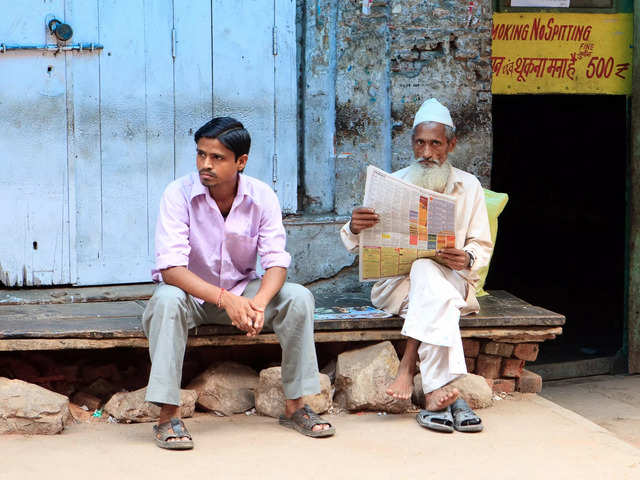
Tarun Rai, Chairman and Group CEO, Wunderman Thompson, South Asia Wunderman Thompson
Tarun Rai, Chairman and Group CEO, Wunderman Thompson, South Asia is confident that the worst is already behind us
Oct 8, 2020, 10:00 IST
ad-agencies
Giving flexibility to people to work remotely or from home should be institutionalized: Tarun Rai, Wunderman Thompson, South Asia
Oct 8, 2020, 10:00 IST
Tarun Rai, Chairman and Group CEO, Wunderman Thompson, South Asia is confident that the worst is already behind us
- While the ad industry is slowly getting back on its feet, there are already visible signs of recovery, and
Tarun Rai , Chairman and Group CEO,Wunderman Thompson , South Asia is confident that the worst is behind us. - We talk to Rai about how the agency managed to weather the storm effectively. He also tells us how the pandemic proved to him that people’s output is what matters and not their physical presence in office.
- He also shared that since the pandemic led to geographical distances becoming immaterial, he will try to work on a 50-50 solution where on any given day, only 50% people will be present at the office.
The last few months have been challenging for not just the advertising industry but the world in general. However, our recent chat with Tarun Rai, Chairman and Group CEO, Wunderman Thompson, South Asia has made us optimistic as he believes the worst is already behind us.
“Ever since the lockdown was announced, we have observed that each month was better than the previous. And with the festive season and cricket coming back, things will keep getting better,” shared Rai.
The economy is in the Unlock 5.0 phase and things are gradually opening up. With that, advertisers are getting over their wariness to advertise. With IPL and expectations of consumer sentiments improving, there is hope that the industry will slowly, but steadily get back on its feet. And the signs of recovery are already there before us.
Sectors like FMCG, e-commerce, insurance and ed-tech did well even during the pandemic and most of these sectors did not hold back on advertising. However, the auto sector, which had been witnessing a slump, even before the pandemic, is seeing an uptick in demand .
So as things slowly start to look up in the economy and also in the advertising industry, we spoke to Rai about what helped Wunderman Thompson weather the storm effectively. He also told us about his biggest learnings from this entire experience, and how he feels
Excerpts:
Q) The last 6-7 months have been challenging. However, things are slowly starting to move towards normalcy. How do you think Wunderman Thompson has fared as an agency in these last few difficult months?
The last few months have been challenging. And ours is a derivative business, if our clients’ businesses aren’t doing well, one of the first things to get impacted is the marketing and advertising budget. However, if I were to talk about how our performance has been, I like to say that May was better than April and June was better than May, and it continues. So I feel that the worst is behind us. Cricket has started and the festival season is coming up. There is a lot of pent up demand that is still not being satiated. The economy has opened up. In Mumbai, restaurants and bars have been allowed to open with a 33% capacity (33% occupancy cap in the city and 50% in the state). So there are a lot of positive signs. I believe the worst period of this crisis is behind us. And I look forward, optimistically, at the next few months.
Q) Has it been challenging for your employees to work in isolation, considering a lot of creative ideas strike during conversations and brainstorming sessions?
The lockdown was announced on March 25 and the first thing that struck me was how agile an organization like ours, actually is. I was really heartened by our organization’s set up, by our IT department, by the alacrity and the agility that we showed, that within 24-48 hours, we were all seamlessly working from home, without any serious disruption of work. It’s also about the resilience and resourcefulness of our people because they adapted very quickly. I was surprised that despite all the difficulties of having to work in a very different environment, where people aren’t physically together, I actually think that creativity did not suffer. In fact, in certain respects, we found more creativity, because people found innovative, new ways of doing things. It also led to greater collaboration because suddenly geographical distance was immaterial. So we could put together the best teams to work on any particular project, and it did not matter whether the talent was in Bangalore, Mumbai, Delhi or Calcutta. I have always believed that there should be
Q) Do you think working from home could become a norm, even once things get back to normal?
I should hope so. Working from home is not always wonderful. And working from home during a lockdown is especially stressful. And we make sure that we recognize that. However, giving flexibility to people to work remotely or from home should be institutionalized. I don't, even for a moment say that there are no advantages of a physical space where people can meet, discuss ideas over a cup of coffee or a game of pool because I think you feed off each other's energy in a physical space. However, going forward, if I can help it, and I'll certainly try, I want to make it a 50-50 solution where on any given day, only 50% of the people need to be physically at work. It will mean tweaking our HR policies and our appraisals systems to make way for newer forms of assessment. It will also need our leadership to be more empathetic, so a lot of things will need to be fixed. But to me, the ideal should be that on any given day, even after this crisis is over, we can allow 50% of our staff to work from home.
Q) How do you feel about your performance as an agency so far this year, in terms of winning new businesses, revenue and even awards?
Our creativity did not suffer due to the pandemic. In fact, we produced some excellent work during this period. Even during the worst time of the lockdown, we found ways of producing new and original content for our clients. We were also recognized as India's most creative agency. And recently, we pretty much swept the award shows so we have got a lot of recognition in these last six months. If you were to look at our revenue in the last six months, revenue from our digital companies is growing in double digits. For the mainline agency, the last six months have been difficult, and I would say the revenue has contracted there. So at an overall level, maybe we are okay because now 35-40% of our revenues are digital revenues. But I can't say the same for the entire ad industry because a lot of the other agencies are not in the sweet spot that we are, where we can genuinely offer end-to-end solutions to our clients. And because there is almost a renewed focus on the digital side of things, on e-commerce and technology, we have been able to manage this crisis a little better in terms of the revenue performance.
Q) Have brands opened up to the idea of spending or are they still being careful with their spends?
With the festive season and cricket coming back, we’re encouraging our clients not to hold back but to invest more. There are enough studies to show that companies and brands that continue to invest during a recession, and especially as we come out of it, are 9 times faster to recover than those who don't. One of our strategic planners has coined a term called ‘bounce back velocity’, which basically means that, during a crisis brands in a particular category are impacted equally. But once you're coming out of a recession, how quickly you recover, or the bounce back velocity will be different for different companies depending on what they do during this period. This is the time to invest, to bounce back faster than the others, and this is the time that will separate the men from the boys. So we are encouraging our clients to spend now, even if they have been conservative in the last six months.
Q) Challenging times also test relationships. Was there an evolution in the relationship you share with your clients?
True partnership is tested during a crisis and I'm very happy that with almost all our clients, our partnerships have only strengthened. A crisis can destroy a relationship or can make it stronger, and I think our partnership with our clients has become stronger. Your relationships are strengthened due to two factors; One, when you are there to offer advice to your partners at the moment they need it the most and two, when you are agile and resourceful enough to meet the requirements of your clients. And I think we have succeeded on both fronts. We have passed the true test of partnership and that bodes very well for our future.
Q) The pandemic has also made people work in isolation, leading to immense stress. Have you been able to address this issue at your agency?
Initially with all the novelty and the excitement of working from home, most people ignored the fact that working from home comes with its own issues and problems. One of the biggest issues, which needed to be recognized upfront, was that this wasn’t work from home in normal circumstances, it was work from home during a global pandemic. So the anxiety levels were elevated. And a lot of people have to work with kids and elderly people at home, who need to be looked after. For a lot of young people living alone, situations like this becomes challenging because loneliness and the lack of social contact becomes an issue. The most important thing was that we were able to recognize these issues. We were also very transparent and made sure that people knew what the organization was doing and what the reality was. If there were challenges, we didn't brush them under the carpet. Rather, we confronted them and spoke to our people. So being transparent, honest and communicating in a crisis is very important. We also made sure that we invested in our people. The pandemic accelerated two years of technology adoption to two months and suddenly there were insecurities about whether one is capable enough to take on this new world. So, we used this time for a lot of online trainings to help people improve their skill-sets, to help them try out new things, to understand how communication and marketing is going to work in the new world which arrived sooner than we had thought it would. So during this period, we had an unbelievable 90 online training programs, which included capability building, but we also did seminars and training programs on mental health issues. Apart from that, we also formed an in-house band, called ‘
Q) How did you see the leadership evolve at the agency during the past few months?
Our leadership has been very empathetic and trusting and I think that's really important. My belief in our people has been reinforced during this pandemic, because they have behaved really responsibly without any need of supervision and that’s been a huge revelation to me, both about our organization and our people.
Q) As a leader, what have your biggest learnings from this experience been so far?
Apart from what I learnt about how our organization can work really resourcefully and efficiently, this pandemic has taught us the importance of flexibility going forward. Whether it is the organizational or compensation structures, we need to be flexible enough to be able to adapt to changes around us.
INSIDER INTELLIGENCE REPORTS







